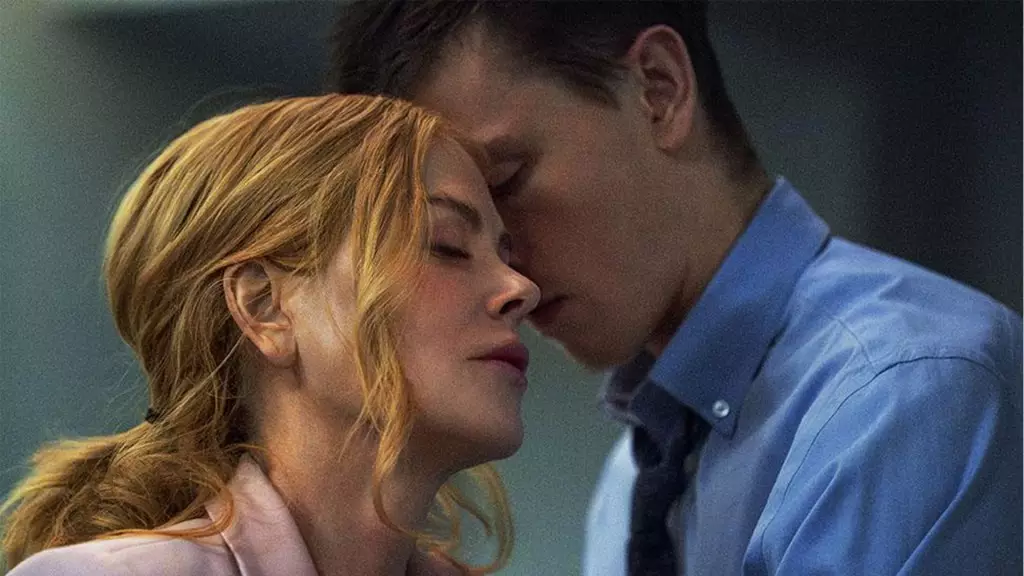In the realm of cinema, the thin line between reality and fiction often becomes blurred, establishing a fertile ground for storytelling. Halina Reijn’s recent work, ‘Babygirl,’ exemplifies this phenomenon through a scene that is not only standout but also intriguingly inspired by her own life experiences. Reijn, as both the writer and director, has navigated through delicate layers of eroticism, effectively showcasing how true events can sometimes resonate with greater intensity than fabricated tales.
The iconic moment in question involves a young intern, Samuel, played by Harris Dickinson, who orders his superior, the formidable CEO Romy (portrayed by Nicole Kidman), to consume a glass of milk at a bar. This seemingly straightforward demand becomes laden with connotations of power dynamics, seduction, and animalistic undertones. In an interview with IndieWire, Reijn revealed her motivation for this daring scene, prompting both audiences and critics to consider the deeper implications of such encounters in their own lives.
Reijn’s choice of milk as an archetype can be interpreted in numerous ways. On one hand, it serves as a metaphor for vulnerability and innocence, contrasting with the inherent chaos of adult relationships. In her commentary, Reijn mentions her own encounter with a well-known Belgian actor who ordered her a glass of milk after a gratifying performance. The experience, while simple, ignited a profound sense of desire and intrigue within her—signifying that eroticism does not always require overt actions, but can stem from nuanced gestures and psychological play.
Reijn’s use of this personal narrative challenges conventional portrayals of sex in film. She emphasizes that the most compelling moments of intimacy often do not manifest through physical acts, but rather through the power of suggestion and mental engagement. Her reflections ignite a conversation regarding the fundamental essence of eroticism, pushing the boundaries of what viewers typically expect to see on screen.
The filmmaker’s perspective resonates with a growing discourse in contemporary cinema about the nature of sexual representation. By asserting that “real, shocking sex is often not at all two bodies banging into each other,” Reijn provokes her audience to reconsider preconceived notions of intimacy. Instead of the typical explicit portrayal, she fosters an understanding of eroticism as something layered and multifaceted, often residing within the mind rather than the flesh.
In a world inundated with visual stimuli, Reijn’s narrative serves as a refreshing approach that prioritizes emotional connection over physical gratification. Her description of Romy’s experience—interactions like crawling on a dirty carpet and the intimate act of licking candy from Samuel’s hands—pushes us to explore the realms of fantasy, boundaries, and desire. It’s an invitation to acknowledge that sexual tension can be established through the mere suggestion of acts and the psychological framing of those moments, igniting conversation without the need for overt physicality.
‘Babygirl’ further delves into the complexities of gender dynamics in the workplace, illustrating how power can be both a weapon and a tantalizing allure. Kidman’s portrayal of Romy is emblematic of women who thrive in male-dominated spheres yet find themselves caught in the snares of personal desire. Through her relationship with the younger Samuel, the film critiques conventional roles, inviting viewers to witness how vulnerability can emerge from positions of power.
Reijn’s artistic direction places emphasis not solely on gender but also on the fluidity of sexual experience across various forms of interaction. It is a powerful commentary on the societal pressures that dictate how relationships are formed and expressed. The film becomes a mirror reflecting our own complexities, making us grapple with our traits that are often brushed aside or considered taboo.
Halina Reijn’s ‘Babygirl’ serves as a provocative exploration of the intricacies of desire, power, and the human experience. It enlightens viewers with the notion that true eroticism thrives not solely on physicality, but rather in the labyrinth of the mind, rendered through symbolism and suggestion. As narratives evolve, it is essential to appreciate the profundity of everyday moments that incite passion, urging both filmmakers and audiences to embrace the beauty of storytelling steeped in reality. This reinforces the idea that sometimes, the most profound experiences are those which are quietly lived, challenging us to find meaning in the unsaid.

